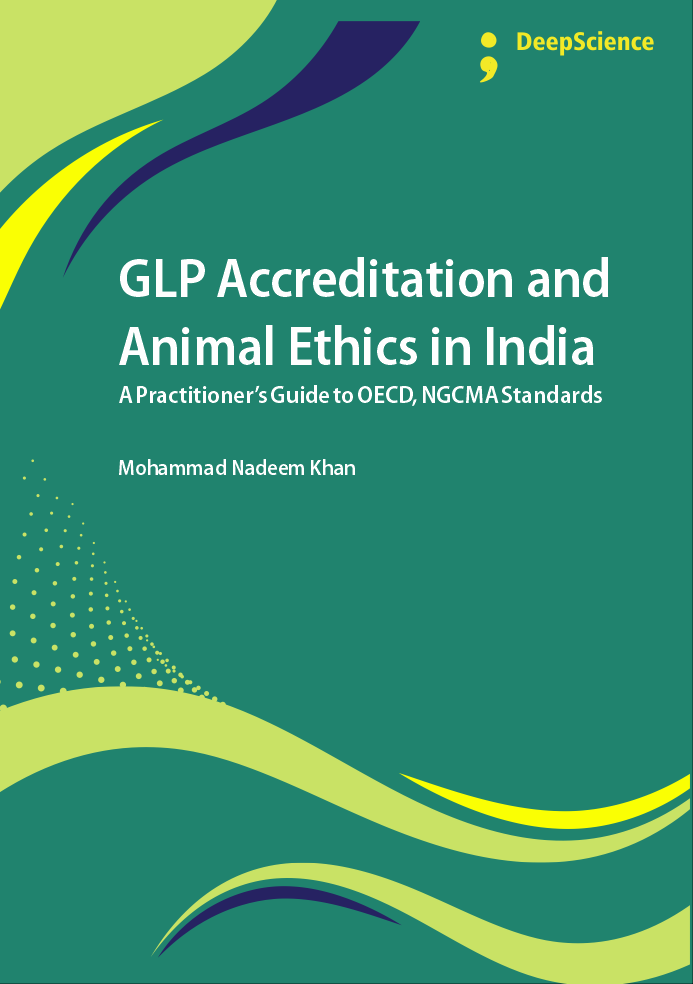GLP Accreditation and Animal Ethics in India: A Practitioner’s Guide to OECD, NGCMA Standards
Keywords:
Good Laboratory Practice, OECD Principles, Mutual Acceptance of Data, Animal Ethics, Replacement, Reduction, RefinementSynopsis
This book represents a practical, and all-encompassing guide to assist researchers, laboratory employees, members of ethics committees, and institutional stakeholders who have been or will be engaged in preclinical animal testing, and regulatory science. This book is organized in seven chapters representing the chronological and progressive development of GLP (Good Laboratory Practice) and the emergence of the R³ concept (Replacement, Reduction and Refinement), and how it can be integrated within a legal framework such as CPCSEA, ICMR guidelines and NDCTR 2019.
Subsequent chapters provide a detailed examination of the OECD GLP principles, India’s National GLP Compliance Monitoring Authority (NGCMA) activities, and the international Mutual Acceptance of Data (MAD) system that supports regulatory harmonization across countries. Additional chapters in this book contain specific information and guidance regarding preparation for GLP inspections, the creation of standard operating procedures (SOP) for laboratories, infrastructure requirements, and the planning of audits to prepare institutions seeking GLP certification.
In addition to providing assistance and resources to support institutions seeking GLP certification, this book places particular emphasis upon the humane treatment of animals in scientific research by providing specific examples of the incorporation of R³ practices, including the use of alternative methods using in vitro and in-silico models. Real-life example case studies and policy recommendations serve to illustrate the current state of affairs in India relative to its position on the world stage of regulation and policy-making. As an increasing number of countries seek to implement stricter standards for the ethical treatment of animals in scientific research, this book is a timely response to the need for increased accountability and transparency in laboratory operations, specifically with regard to the reliability of data and the integrity of scientific inquiry. As a desk reference and resource for individuals who are responsible for navigating the complex process of obtaining GLP accreditation and conducting animal-based research ethically in India, I would like to express my sincerest gratitude to the regulatory officials, peer reviewers, and institutional stakeholders whose input helped shape this book into what it has become today. It is my sincere desire that this book may contribute to the advancement of ethical excellence, capacity building, and acceptance of Indian preclinical research at a global level.
References
Choudhury, D. R., & Sharma, N. (2021). Building competencies in GLP & animal ethics in India. Indian Journal of Pharmacology, 53(4), 255–261.
DCGI. (2019). New Drugs and Clinical Trials Rules, 2019. Ministry of Health and Family Welfare, Government of India.
EPAA. (2022). European Partnership for Alternative Approaches to Animal Testing Annual Report 2022. https://ec.europa.eu/growth/sectors/chemicals/epaa_en
Government of India. (2020). National Education Policy (NEP) 2020. Ministry of Education. https://www.education.gov.in
ICMR. (2023). Ethical Guidelines for Biomedical Research Involving Animals. Indian Council of Medical Research, New Delhi.
National GLP Compliance Monitoring Authority. (2023). GLP Newsletter. Department of Science & Technology, Government of India.
OECD. (2021). Mutual Acceptance of Data: A Cornerstone of OECD Chemical Safety Policy (OECD Series on Principles of GLP and Compliance Monitoring No. 1). Organisation for Economic Co-operation and Development.
Revised CPCSEA Guidelines for Laboratory Animal Facilities. (2021). Ministry of Environment, Forest and Climate Change, Government of India.













